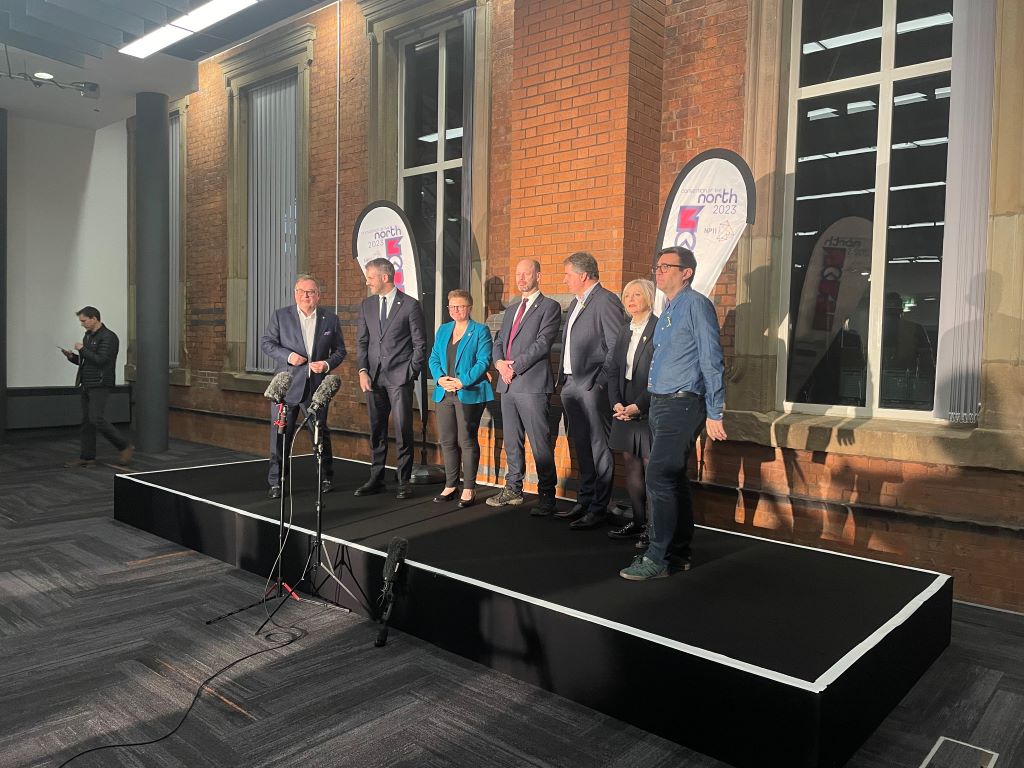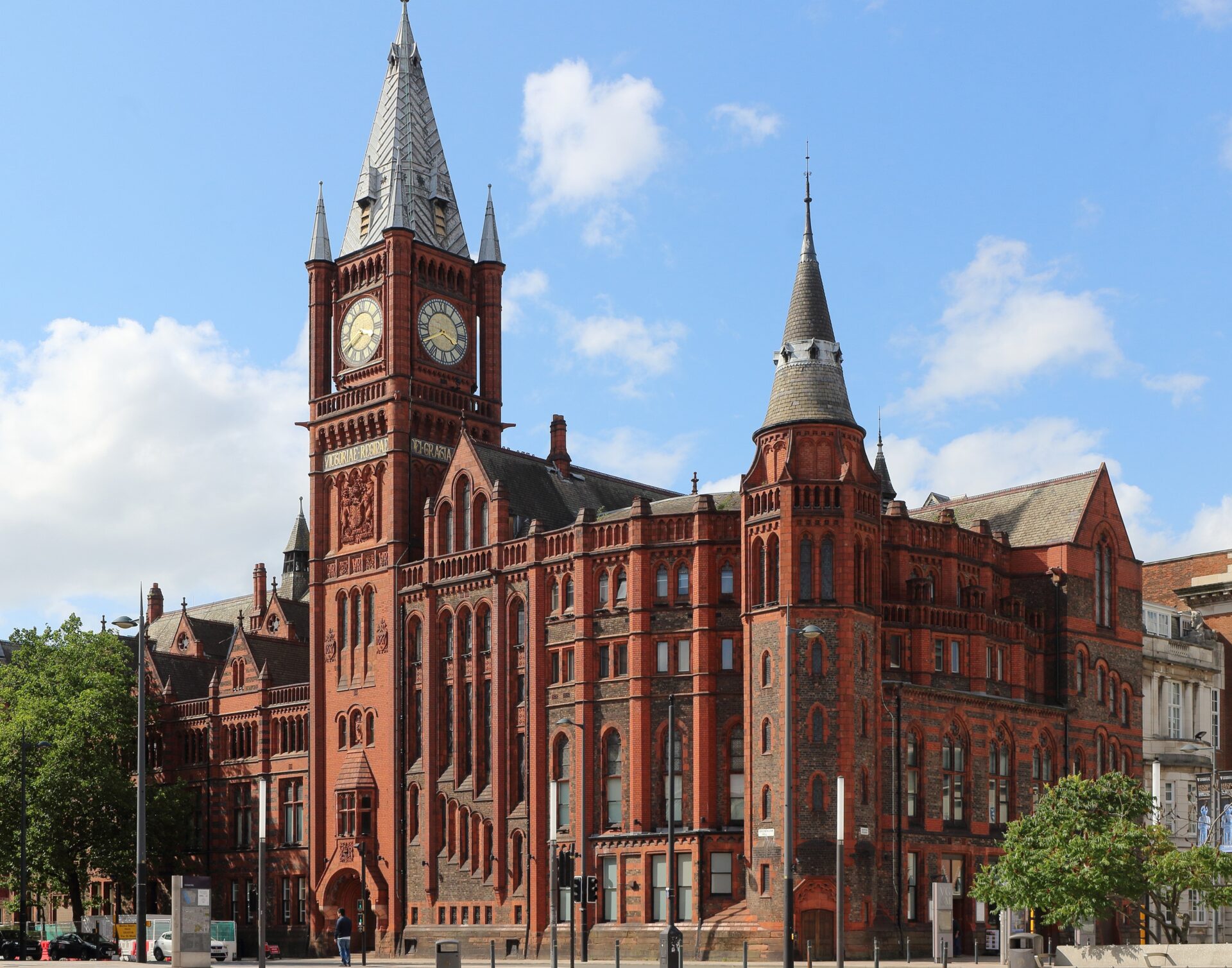Convention of the North: five takeaways from the conference
Political and business leaders converged on Manchester Central yesterday to present a united front to lobby the government to hard-wire levelling up into law and address stark regional inequalities.
Here are the main talking points from a busy day in Manchester.
Gove’s flying visit
Michael Gove has a certain magnetism. A packed auditorium waited in a state of giddy excitement for him to take to the stage. He was the star attraction at the day-long Convention of the North, organised by NP11, and had to be hurried along by host Evan Davis after going over his allotted 30-minute slot. Shortly after, he was gone.
The convention saw around 1,000 delegates including the North’s most powerful and high-profile political figures, come together in one place to talk about the challenges and opportunities facing the North. This rarely happens. It might, therefore, have been instructive for Gove – the man whose job it is to ensure equality across the country – to spend more than 35 minutes at the event.
He came to give a speech, the highlight of the day for many, but how much listening did he do? Politicians, especially ones like Gove, are very busy people, but his flying visit to Manchester could be viewed as an indication to the people trying to drive change in the North that the government is not taking their plight seriously enough.
The end of the line for TPE?
One topic that was unavoidable at the Convention of the North was the state of the North’s railways. Indeed, a group of mayors including Andy Burnham, and Steve Rotheram, used the event as a platform to call on the government to strip Transpennine Express of its contract.
More than 18,000 TPE trains have been cancelled in the last year, according to Burnham, while Tracy Brabin, Mayor of West Yorkshire and self-described “survivor of Transpennine Express”, said the current transport system was costing the Northern economy £8m a week.
Joanna Key, director of growth and infrastructure at HM Treasury, was one of the panellists at a workshop all about transport. “When I told my colleagues I was coming to an event in the North to talk about trains, there was a sharp intake of breath”, she said. Key defended the government’s approach to improving transport, saying that capital expenditure had increased by 50% since 2017.
“There is a lot of money going in but it doesn’t feel like that,” she admitted, blaming that feeling on historical underinvestment and the fact that “a lot of [the money] has been spent on HS2”.
Positivity is not enough
In his opening remarks, host BBC journalist and presenter Evan Davis said the current mood in the UK was one of “enormous pessimism”. The business and political leaders in attendance then spent the rest of the day trying to foster a feeling of positivity among delegates.
Cllr Bev Craig, Leader of Manchester City Council, said the Northern stakeholders should adopt an attitude of “hope, optimism and ambition”. The North, she and others said, has so much potential and can contribute a great deal to UK plc. The challenge, as ever, is convincing the government to remove the North’s shackles, both fiscally and in terms of devolved powers.
“The level of funding at the moment is not commensurate with the level of the opportunity,” said Sir Roger Marsh, convention co-chair and chair of the NP11 group of northern LEPs. “Power and pounds, we need to be given the tools”.
Devolution not revolution
Leaders in the North of England have long admired Germany’s regional governance structure and regularly point to it saying “we want that” or at least something like it. A video from East Germany minister Carsten Schnieder gave attendees some insight into German levelling up in action. The Bundestag is giving €40bn to coal regions in East Germany for regenerative projects aimed at transforming areas that would be impacted by the government’s intention to halt coal mining in the country at some point in the 2030s.
The most important part of this initiative is that the cash is being given directly to regional commissions to spend as they see fit. This differs from Whitehall’s approach to levelling up, which requires councils to put forward specific projects for government approval.
While the adoption of a federal system in the UK is a pipe dream, a more realistic demand from the North’s leaders was repeated throughout the day: rather than piecemeal funding, they want a single lump sum given to each devolved area to spend however they deem appropriate, much like the deal Wales and Scotland currently have.
Skills to pay the bills
Andy Burnham wants to create the UK’s first technical education system that would allow the Greater Manchester Combined Authority to assess the market and deliver courses accordingly to plug the skills gap. The GM mayor said he was hopeful that Michael Gove’s positive attitude towards devolution could see it happen.
Liverpool Metro Mayor Steve Rotheram was less hopeful, warning that previous attempts to boost skills through the apprentice levy fund had failed. “The funding was raised to address the skills shortages we have and yet we can’t get access to it,” he said. Indeed, Rotheram made a beeline for Gove after his speech to make this point to him directly. He managed to do so, before the minister was whisked off to his next engagement.





There needs to be devolution deals for Lancashire and Cheshire. Greater Manchester and Liverpool dominate too much, there’s a north-north divide never mind a north-south divide. Just as much potential in Lancashire and Cheshire.. and probably cheaper opportunities too for development.
By Katie
The north has suffered for decades from underinvestment from central government. Whilst our money is spent subsidising mega projects like Crossrail in London, we get nothing. I’m fine with London getting those investments, they need it. But we need investment also!
We should be realistic though and not put all our eggs in one basket hoping a new high speed line from Liverpool to Leeds will sort out the transport problems. That’ll likely take multiple decades to deliver, we don’t have that time. Why not start where the main bottleneck is and separate intercity trains from local ones through Manchester? CrossNorth Programme who I found on twitter has a great scheme that seems to be a reasonable compromise, and it doesn’t appear to replace a new line either, just become the first part of it.
We should be as pragmatic as possible, whilst also rightly campaigning for the funding the region deserves! The leaders have made their point well, but we need specific solutions rather than just complaining!
By Anonymous
The government needs to focus investment in large conurbations like Manchester, the South east is successful because London drives most of the economic growth with supporting towns. Spreading investment in all these small locations doesn’t create job growth.
By Anonymous
Manchester deserves its own Crossrail to get across the NW region more easily – it shouldn’t take so long to get from Liverpool to Leeds in the 21st Century
However resist the temptation to always make comparisons with London. The London Crossrail will help some pretty deprived areas – Southall, Whitechapel, Abbey Wood. If there was a “Place South West” people in Devon and Cornwall would be making the same points.
By Crossrailer
@Crossrailer I saw the hilarious bbc article the other day about commuters complaining that crossrail hasn’t delivered what was promised. Those guys are getting comparative riches compared to the services in the north!!
By Levelling Up Manager
So underwhelming that so little progress has been made in the last 20 years. Underinvestment and bias towards the SE or prosperous communities coupled the loss of the RDAs in favour of LEPs in the distribution of funds. Decentralisation has been a topic for decades, over 10 years ago Lord Hesiltine proposed greater decentralisation and we’re still seeing decisions taken centrally. That said policies that should be taken centrally to set aspirations nationally in housing numbers and industrial strategy are now none existent. So disheartening.
By TJL
Crossrail is a dirty word in the North. It raises Northern hackles. That service was not about deprived areas being linked but biased, blatant infrastructure investment towards the South East, from the last Labour government , those places are already well served which one reader listed. Whitechapel is within walking distance of the City and the West End, it isn’t Heywood. Southall has a mainline station which takes people into Central London quickly. There was no justification for Crossrail and the late Queen and the Cabinet riding on it,was rubbing our noses in it, not just ours, but the other large conurbations in this country. Grant Shapps telling us how that train line will benefit the whole of Britain, when someone has been waiting an hour in a blizzard on Huddersfield station for a train to Leeds. What Westminster has done to the North since 1979, is simply neglect. They have consistently ignored us, and patronised us. The comparisons with the South West are pointless, as after Bristol the biggest place is Plymouth, which is a similar size to Bolton. The North has at least twenty towns of that size. There has yet to be, one shovel in the ground regarding NPR and Osborne announced that ten years ago. It is shameful and Gove knows it.
By Elephant
A devolution deal for Lancashire !! Need to sort the local government mess first . A cumbersome and inefficient county council , two quite successful unitary councils and 12/13 tiny districts . All fighting each other . Need for 4/5 unitary councils with a combined authority and mayor then maybe a devolution deal with work , but most of LAs will ondo thus if compelled .to much self interest ! !
By George
@Katie
There’s a divide because places like Liverpool and particularly Manchester bend over backwards and are willing to do the things that other places won’t because they are progressive and forward thinking.
Not that other places don’t deserve more investment, but blaming other cities for your loss is really giving Westminster more ammunition than it deserves.
By Anonymous
@ 7:12 pm
By Anonymous
I think Katie has a good point. Both Lancashire and Cheshire have dynamic economies, the Red Rose County with its advanced manufacturing and aerospace specialisms, and Cheshire with its life sciences, advanced engineering and professional outputs. In fact, Warrington is one of the economic success stories of the past forty years. Progressive and forward-thinking places by any metric.
I do feel that both counties need devolution though. With Lancashire, there’s a case for full unitarisation – five or six Council would be appropriate here, like in LCR and Tees Valley. But local reorganisations are not cheap. It’s also now not a requisite for devolution. And town councils in places like Chorley, Accrington and Lytham would need to be set up should a shake up happen. Localism needs to occur at both the county and the town and parish level so I can understand the concerns of districts. Working with all stakeholders is key.
By SW